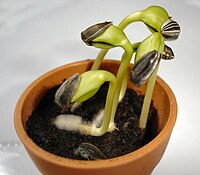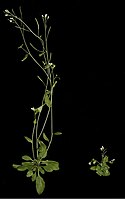
Small nucleolar RNA of silkworm can translocate from the nucleolus to the cytoplasm under abiotic stress
Sign Up to like & getrecommendations! Published in 2021 at "Cell Biology International"
DOI: 10.1002/cbin.11555
Abstract: Small nucleolar RNAs (snoRNAs) are thought to be exclusively nuclear and guide nucleotide modifications of ribosomal RNAs. Recently, more and more evidence has suggested that the nucleolus is a stress sensor for changes in growth… read more here.
Keywords: silkworm; small nucleolar; cytoplasm abiotic; stress ... See more keywords

Identification of the histone demethylases gene family in Glycyrrhiza inflata reveals genes responding to abiotic stresses
Sign Up to like & getrecommendations! Published in 2022 at "Journal of Cellular Biochemistry"
DOI: 10.1002/jcb.30315
Abstract: Glycyrrhiza inflata Bat. is a type of abiotic‐stress‐resistant plant with extremely high medicinal value. Histone demethylases (HDMTs) have been known to play crucial roles in the regulation of abiotic stress response. However, the molecular functions… read more here.
Keywords: gihdmt genes; stress; histone demethylases; abiotic stress ... See more keywords

Analysis of Brassica oleracea early stage abiotic stress responses reveals tolerance in multiple crop types and for multiple sources of stress.
Sign Up to like & getrecommendations! Published in 2017 at "Journal of the science of food and agriculture"
DOI: 10.1002/jsfa.8411
Abstract: BACKGROUND Brassica oleracea includes a number of important crop types such as cabbage, cauliflower, broccoli and kale. Current climate conditions and weather patterns are causing significant losses in these crops, meaning that new cultivars with… read more here.
Keywords: crop types; brassica oleracea; stress; abiotic stress ... See more keywords

Abiotic Stress Phenotyping of Polyamine Mutants.
Sign Up to like & getrecommendations! Published in 2018 at "Methods in molecular biology"
DOI: 10.1007/978-1-4939-7398-9_32
Abstract: Plant mutants in polyamine pathway genes are ideal for investigating their roles in stress responses. Here we describe easy-to-perform methods for phenotyping Arabidopsis mutants under abiotic stress. These include measurements of root growth, chlorophyll content,… read more here.
Keywords: stress phenotyping; polyamine mutants; mutants abiotic; stress ... See more keywords

Novel Micro-Phenotyping Approach to Chemical Genetic Screening for Increased Plant Tolerance to Abiotic Stress.
Sign Up to like & getrecommendations! Published in 2018 at "Methods in molecular biology"
DOI: 10.1007/978-1-4939-7874-8_2
Abstract: Studying the effects of small molecules on root system development in the context of a large-scale chemical genetic screen has previously been a technical challenge. The recent development of novel seedling growth devices ("Phytostrips"), used… read more here.
Keywords: root system; chemical genetic; chemical; abiotic stress ... See more keywords

An LRR-only protein regulates abscisic acid-mediated abiotic stress responses during Arabidopsis seed germination
Sign Up to like & getrecommendations! Published in 2020 at "Plant Cell Reports"
DOI: 10.1007/s00299-020-02538-8
Abstract: LRRop-1, induced by DOF6 transcription factor, negatively regulates abiotic stress responses during Arabidopsis seed germination. The lrrop-1 mutant has reduced ABA signaling, which is part of the underlying stress-remediation mechanism. The large family of leucine-rich… read more here.
Keywords: seed; seed germination; stress; stress responses ... See more keywords

Roles of Nitric Oxide in Conferring Multiple Abiotic Stress Tolerance in Plants and Crosstalk with Other Plant Growth Regulators
Sign Up to like & getrecommendations! Published in 2021 at "Journal of Plant Growth Regulation"
DOI: 10.1007/s00344-021-10446-8
Abstract: Nitric oxide (NO) is a free-radical gasotransmitter signaling molecule associated with a varied spectrum of signal transduction pathways linked to inducing cross-adaptation against abiotic stresses. It has crucial roles from seed germination to plant maturity,… read more here.
Keywords: plant growth; abiotic stress; nitric oxide; stress ... See more keywords

Lipid, phenol and carotenoid changes in ‘Bianca’ grapevine leaves after mechanical wounding: a case study
Sign Up to like & getrecommendations! Published in 2017 at "Protoplasma"
DOI: 10.1007/s00709-017-1100-5
Abstract: Metabolic changes can occur in plants in response to abiotic stress. Extensive use of leaf discs (mechanical wounding) in studies regarding the effect on the biochemical response of the grapevine to different types of biotic… read more here.
Keywords: mechanical wounding; stress; abiotic stress; grapevine ... See more keywords

Isolation, functional characterization and efficacy of biofilm-forming rhizobacteria under abiotic stress conditions
Sign Up to like & getrecommendations! Published in 2019 at "Antonie van Leeuwenhoek"
DOI: 10.1007/s10482-019-01306-3
Abstract: Abiotic stresses such as salinity, drought and excessive heat are associated with significant loss of crop productivity globally, and require effective strategies for their reduction or tolerance. Biofilm-forming rhizobacteria, which harbor multifarious plant growth promoting… read more here.
Keywords: stress conditions; plant; forming rhizobacteria; biofilm forming ... See more keywords

Genome-wide identification, characterization, and expression analyses of the HAK/KUP/KT potassium transporter gene family reveals their involvement in K+ deficient and abiotic stress responses in pear rootstock seedlings
Sign Up to like & getrecommendations! Published in 2018 at "Plant Growth Regulation"
DOI: 10.1007/s10725-018-0382-8
Abstract: High-affinity K+ (HAK)/K+ uptake (KUP)/K+ transporters (KT) play crucial roles in the regulation of cellular K+ levels. However, little is known about these genes in the Rosaceae family. In this study, 56 putative HAK/KUP/KT genes… read more here.
Keywords: kup; family; stress responses; abiotic stress ... See more keywords

Transcriptome analysis reveals genes commonly responding to multiple abiotic stresses in rapeseed
Sign Up to like & getrecommendations! Published in 2019 at "Molecular Breeding"
DOI: 10.1007/s11032-019-1052-x
Abstract: Rapeseed production is limited by abiotic stresses such as drought, salinity, and low temperature. Evidences suggest that common stress response genes are shared by multiple stresses. To study how rapeseed responds to abiotic stresses at… read more here.
Keywords: multiple abiotic; analysis; abiotic stresses; stress ... See more keywords